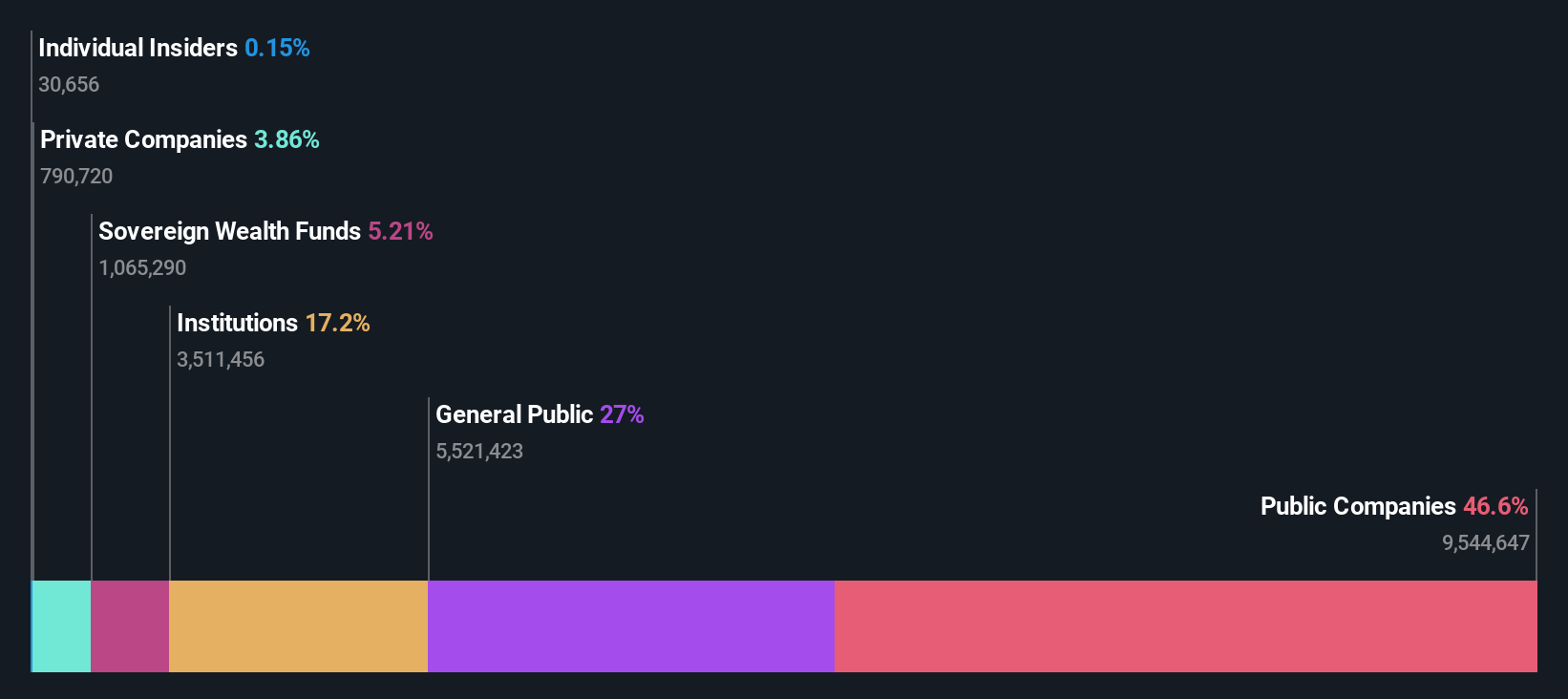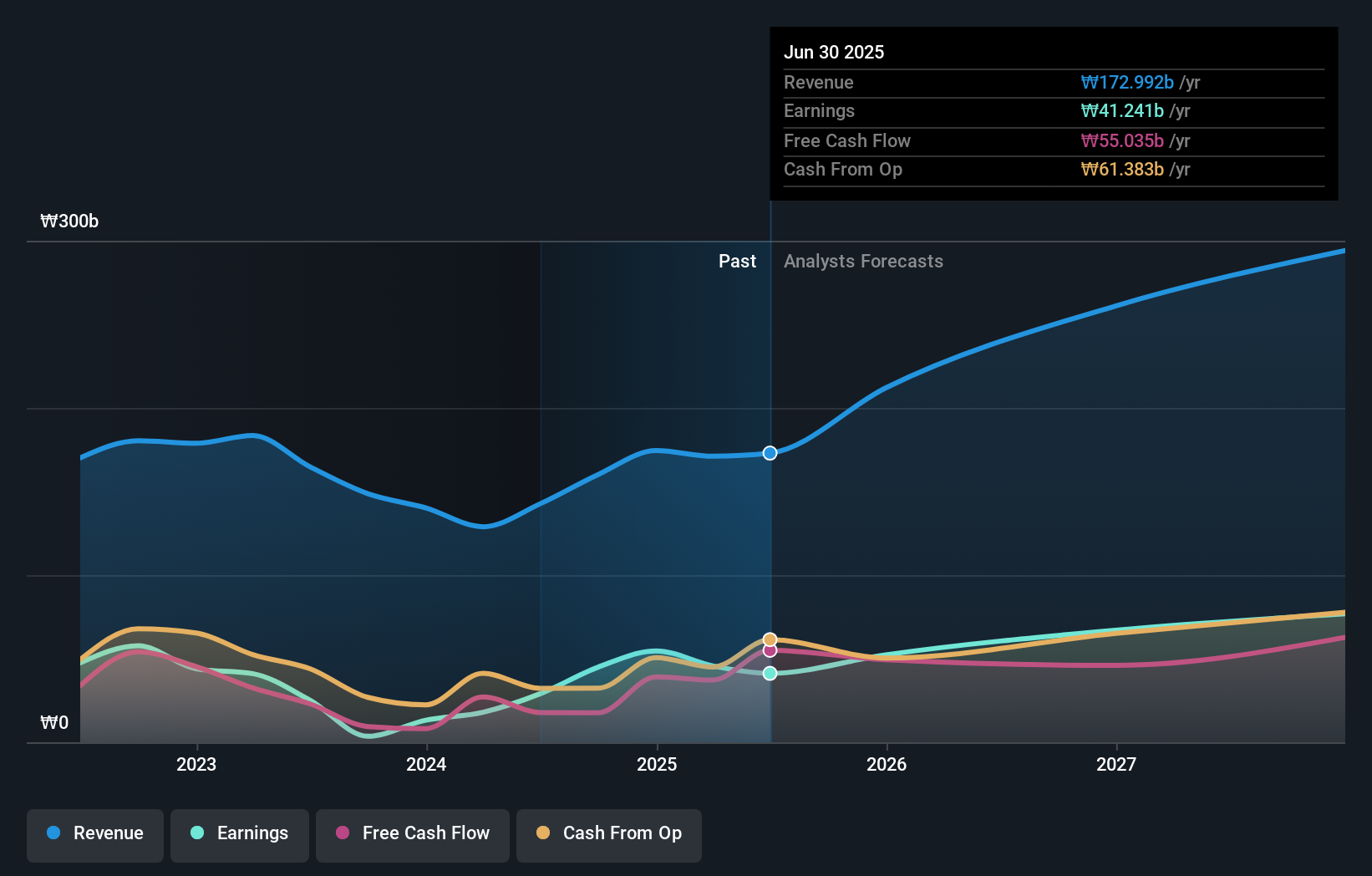- South Korea
- /
- Semiconductors
- /
- KOSDAQ:A095340
ISC Co., Ltd.'s (KOSDAQ:095340) biggest owners are public companies who got richer after stock soared 9.0% last week
Key Insights
- The considerable ownership by public companies in ISC indicates that they collectively have a greater say in management and business strategy
- The top 2 shareholders own 52% of the company
- 17% of ISC is held by Institutions
A look at the shareholders of ISC Co., Ltd. (KOSDAQ:095340) can tell us which group is most powerful. And the group that holds the biggest piece of the pie are public companies with 47% ownership. Put another way, the group faces the maximum upside potential (or downside risk).
Clearly, public companies benefitted the most after the company's market cap rose by ₩106b last week.
Let's take a closer look to see what the different types of shareholders can tell us about ISC.
Check out our latest analysis for ISC

What Does The Institutional Ownership Tell Us About ISC?
Institutional investors commonly compare their own returns to the returns of a commonly followed index. So they generally do consider buying larger companies that are included in the relevant benchmark index.
We can see that ISC does have institutional investors; and they hold a good portion of the company's stock. This can indicate that the company has a certain degree of credibility in the investment community. However, it is best to be wary of relying on the supposed validation that comes with institutional investors. They too, get it wrong sometimes. It is not uncommon to see a big share price drop if two large institutional investors try to sell out of a stock at the same time. So it is worth checking the past earnings trajectory of ISC, (below). Of course, keep in mind that there are other factors to consider, too.

ISC is not owned by hedge funds. SKC Co., Ltd. is currently the largest shareholder, with 47% of shares outstanding. With 5.2% and 4.3% of the shares outstanding respectively, Norges Bank Investment Management and National Pension Service are the second and third largest shareholders.
To make our study more interesting, we found that the top 2 shareholders have a majority ownership in the company, meaning that they are powerful enough to influence the decisions of the company.
Researching institutional ownership is a good way to gauge and filter a stock's expected performance. The same can be achieved by studying analyst sentiments. There are plenty of analysts covering the stock, so it might be worth seeing what they are forecasting, too.
Insider Ownership Of ISC
While the precise definition of an insider can be subjective, almost everyone considers board members to be insiders. Company management run the business, but the CEO will answer to the board, even if he or she is a member of it.
Insider ownership is positive when it signals leadership are thinking like the true owners of the company. However, high insider ownership can also give immense power to a small group within the company. This can be negative in some circumstances.
Our data suggests that insiders own under 1% of ISC Co., Ltd. in their own names. However, it's possible that insiders might have an indirect interest through a more complex structure. It seems the board members have no more than ₩1.9b worth of shares in the ₩1.3t company. We generally like to see a board more invested. However it might be worth checking if those insiders have been buying.
General Public Ownership
With a 27% ownership, the general public, mostly comprising of individual investors, have some degree of sway over ISC. This size of ownership, while considerable, may not be enough to change company policy if the decision is not in sync with other large shareholders.
Private Company Ownership
It seems that Private Companies own 3.9%, of the ISC stock. Private companies may be related parties. Sometimes insiders have an interest in a public company through a holding in a private company, rather than in their own capacity as an individual. While it's hard to draw any broad stroke conclusions, it is worth noting as an area for further research.
Public Company Ownership
We can see that public companies hold 47% of the ISC shares on issue. This may be a strategic interest and the two companies may have related business interests. It could be that they have de-merged. This holding is probably worth investigating further.
Next Steps:
While it is well worth considering the different groups that own a company, there are other factors that are even more important. Be aware that ISC is showing 1 warning sign in our investment analysis , you should know about...
If you would prefer discover what analysts are predicting in terms of future growth, do not miss this free report on analyst forecasts.
NB: Figures in this article are calculated using data from the last twelve months, which refer to the 12-month period ending on the last date of the month the financial statement is dated. This may not be consistent with full year annual report figures.
New: AI Stock Screener & Alerts
Our new AI Stock Screener scans the market every day to uncover opportunities.
• Dividend Powerhouses (3%+ Yield)
• Undervalued Small Caps with Insider Buying
• High growth Tech and AI Companies
Or build your own from over 50 metrics.
Have feedback on this article? Concerned about the content? Get in touch with us directly. Alternatively, email editorial-team (at) simplywallst.com.
This article by Simply Wall St is general in nature. We provide commentary based on historical data and analyst forecasts only using an unbiased methodology and our articles are not intended to be financial advice. It does not constitute a recommendation to buy or sell any stock, and does not take account of your objectives, or your financial situation. We aim to bring you long-term focused analysis driven by fundamental data. Note that our analysis may not factor in the latest price-sensitive company announcements or qualitative material. Simply Wall St has no position in any stocks mentioned.
About KOSDAQ:A095340
ISC
Develops, manufactures, and sells semiconductor test sockets worldwide.
Flawless balance sheet with solid track record.
Market Insights
Community Narratives



